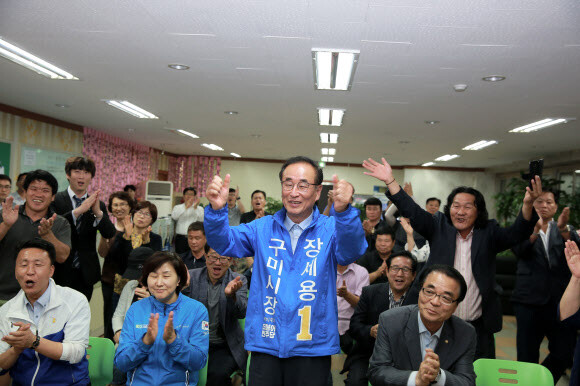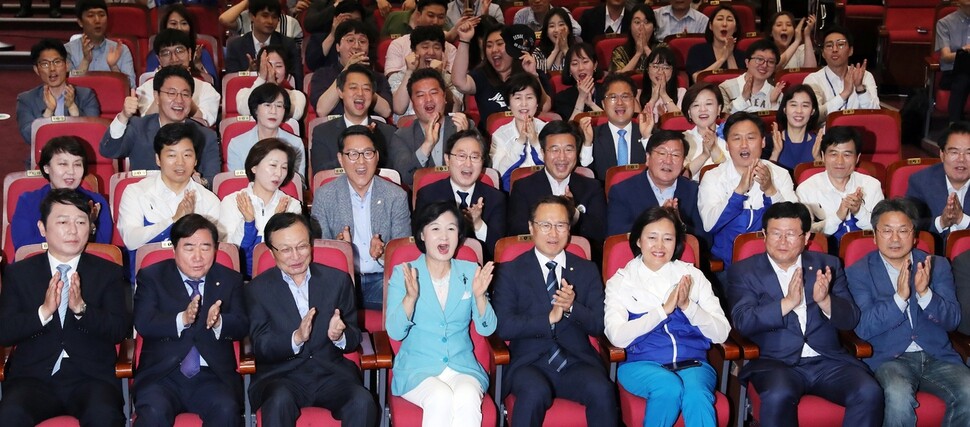hankyoreh
Links to other country sites 다른 나라 사이트 링크
[Editorial] South Korean voters choose peace as walls or regionalism tumble down

In South Korea’s 7th local elections, which were held on June 13, the ruling Democratic Party crushed its opponents in a record-setting victory. The votes counted by last night showed that the Democratic Party had swept not only the Seoul region and Chungcheong and Gangwon provinces, but even Busan, Ulsan and South Gyeongsang Province, representing 14 of the 17 total provinces and metropolitan areas that were contested in the election.
In the case of South Gyeongsang Province, the tally had been close at first, but Democratic Party candidate Kim Gyeong-su’s was elected. The Liberty Korea Party only managed to take two of the major mayoral and gubernatorial seats, in Daegu and North Gyeongsang Province. Hardly ever has a single party triumphed like this in nearly every part of the country – including the fractious southwest and southeast regions – since local elections began in 1995. Simply put, the once-rigid walls of regionalism are come tumbling down.
The Democratic Party also completely dominated the by-elections in the National Assembly, clinching at least 11 of the 12 seats that were up for grabs. This enables the Democratic Party to solidify its position as the dominant party in the National Assembly and to take the lead in national governance. Liberal candidates also enjoyed a sweeping victory in the elections for the 14 among 17 metropolitan and provincial superintendents of schools, just as they did in the previous local election, which means that liberal school superintendents will remain in charge.
This overwhelming victory by the ruling Democratic Party signifies a crushing defeat for the Liberty Korea Party, the leading opposition party. During the party’s major losses, first in the presidential election last year and now in these local elections, South Korea’s conservative politicians have gone through the wringer. The Liberty Korea Party has been thrown into chaos, with Hong Jun-pyo hinting yesterday evening that he will step down as party leader.
And in the Seoul mayoral elections, the Bareunmirae Party, the second-largest conservative party, only received a paltry number of votes in most parts of the city, despite a grueling campaign by party candidate Ahn Cheol-soo. The entire conservative establishment finds itself standing at the crossroads of reform and reorganization.
Elections indicative of popular support for President Moon
The biggest message of these election results is that Koreans are relatively pleased with President Moon Jae-in’s first year in office. This appears to represent major support for President Moon’s efforts to bring peace to the Korean Peninsula. It can also be seen as an affirmation of the communicative leadership that President Moon has shown over the past year and his efforts to eradicate deep-rooted vices. A recent debate over economic policies, including the minimum wage, was overshadowed by the Korean Peninsula issues, and that debate did not emerge as a major issue in the local elections. The fact that the public has clearly sided with the ruling party in these elections gives President Moon a boost of confidence to push ahead with his reform initiatives and his foreign policy of peace and prosperity.
The Democratic Party’s electoral success in Busan, Ulsan and South Gyeongsang Province is particularly noteworthy in that it represents the triumph of national unity over regional sentiment. Never before have candidates from the Democratic Party or its forerunners been victorious in these metropolitan and gubernatorial races in the 23 years since the local elections began in 1995.
Even the Democratic Party candidate in Daegu put on a good showing, representing a seismic shift in voters’ sentiments in the Yeongnam region, the traditionally conservative southeast corner of the peninsula. This is the result of voters here moving away from regional voting loyalties and making rational and thoughtful choices. This trend away from regionalism will gain even more impetus when it spreads to other regions as well, including Honam in the southwest.
The collapse of the conservatives was so shocking that it is the most striking trend in this election. Conservatives will complain that the election was tilted toward the ruling party because of President Moon’s sky-high approval rating and the concurrence of “the historic North Korea-US summit, but the outcome was still surprising. Candidates from the Liberty Korea Party and other opposition parties failed to gain traction not only around Seoul but in most of the country, including Yeongnam.
The gap between first and second place was greater than in any previous local election. It is no exaggeration to say that this historic defeat means that voters have cast judgment on conservative politicians and that those politicians will have no future unless they completely reinvent themselves.

Fall of anachronistic conservatives
Much of the blame for the fall of the conservatives belongs to opposition politicians who were too preoccupied with stonewalling and anachronistic speech and behavior to see how the wind was blowing. One of the best examples was the erratic behavior of Hong Jun-pyo. Voters were repelled by one irresponsible move after another, including his denigration of the inter-Korean summit, which would decide the fate of the Korean nation, as a “political charade,” and his abrupt about-face on his promise to hold a vote on a constitutional amendment at the same time as the regional election.
South Korea’s conservatives have still not adequately reckoned with how they lost the executive branch through the impeachment of Park Geun-hye, and now voters have said it is time for a thorough reckoning and reform.
While many pundits expected this election to be marked by more apathy than ever before, with attention focusing on the North Korea-US summit, the voting turnout was fairly high, at 60.2 percent. This was likely affected by the adoption of an early voting system that brought out more voters, but it can also be seen as a continuation of high political awareness and passion about participation in the political process that the public demonstrated in last year’s presidential election. It is also fair to say that this reflects the public’s desire to build a “functional country,” the demand that was made during the candlelit rallies and that was evident during the presidential election.
Landslide winning a warning against ruling party becoming self-satisfied
The results of this election must lead to efforts to further expand and strengthen self-government and decentralization, as well as justice and fairness both at the local level and in the central government. The ruling party must not become self-satisfied about its victory in this election. It needs to make a level-headed assessment of its mistakes and successes over the past year. It also needs to take an even closer look at the national economy and take measures to ensure that the working class’s quality of life is not damaged. Another lesson to be learned from the Liberty Korea Party’s downfall is that when power goes to your head, you can find yourself rolling down the cliff at any moment.
The conservative opposition parties have a backbreaking effort ahead of them. They need a complete overhaul – in both word and deed -- that will continue until the public is satisfied. We hope this election will be a blessing in disguise for the conservatives, allowing them to reorganize themselves into a reasonable party.
Please direct comments or questions to [english@hani.co.kr]

Editorial・opinion
![[Column] Has Korea, too, crossed the Rubicon on China? [Column] Has Korea, too, crossed the Rubicon on China?](https://flexible.img.hani.co.kr/flexible/normal/500/300/imgdb/original/2024/0419/9317135153409185.jpg) [Column] Has Korea, too, crossed the Rubicon on China?
[Column] Has Korea, too, crossed the Rubicon on China?![[Correspondent’s column] In Japan’s alliance with US, echoes of its past alliances with UK [Correspondent’s column] In Japan’s alliance with US, echoes of its past alliances with UK](https://flexible.img.hani.co.kr/flexible/normal/500/300/imgdb/original/2024/0419/2317135166563519.jpg) [Correspondent’s column] In Japan’s alliance with US, echoes of its past alliances with UK
[Correspondent’s column] In Japan’s alliance with US, echoes of its past alliances with UK- [Editorial] Does Yoon think the Korean public is wrong?
- [Editorial] As it bolsters its alliance with US, Japan must be accountable for past
- [Guest essay] Amending the Constitution is Yoon’s key to leaving office in public’s good graces
- [Editorial] 10 years on, lessons of Sewol tragedy must never be forgotten
- [Column] A death blow to Korea’s prosecutor politics
- [Correspondent’s column] The US and the end of Japanese pacifism
- [Guest essay] How Korea turned its trainee doctors into monsters
- [Guest essay] As someone who helped forge Seoul-Moscow ties, their status today troubles me
Most viewed articles
- 1[Column] The clock is ticking for Korea’s first lady
- 2[Correspondent’s column] In Japan’s alliance with US, echoes of its past alliances with UK
- 3After 2 months of delayed, denied medical care, Koreans worry worst may be yet to come
- 4[Column] Has Korea, too, crossed the Rubicon on China?
- 5[Editorial] When the choice is kids or career, Korea will never overcome birth rate woes
- 6Samsung barricades office as unionized workers strike for better conditions
- 7US exploring options for monitoring N. Korean sanctions beyond UN, says envoy
- 8US overtakes China as Korea’s top export market, prompting trade sanction jitters
- 9[Photo] Smile ambassador, you’re on camera
- 10Hong Se-hwa, voice for tolerance whose memoir of exile touched a chord, dies at 76